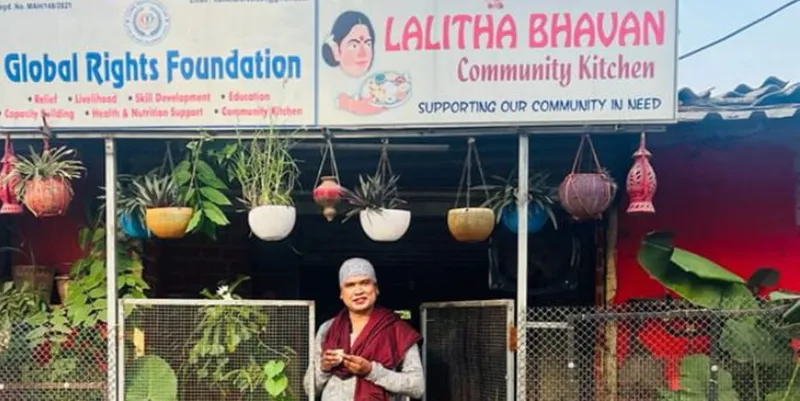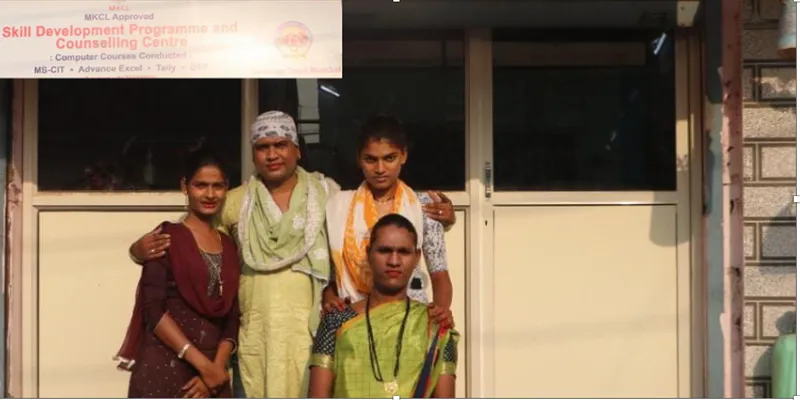[Queer Changemakers] 'It will take another 25-30 years to get proper rights and mainstream visibility for the transgender community'
Dr Nambiar speaks about the elderly, migration, and her dream to build a second home for the transgender community.
Dr Yoga Sreelesh Nambiar was born and raised in a middle-class family. Despite having her parents' unwavering support, she faced a lot of abuse and discrimination from society and even her own relatives. Several of them told her parents not to send her to school or educate her. Her parents refused to listen and she became the first transgender person in India to be awarded a PhD in mental health.
An award winner for her contribution to the arts, today, she is a leading activist for the transgender community, sex workers, and migrant workers.
Can you help us understand the local community you are working with and the challenges they faced during the pandemic?
We work in the Ulhasnagar area of Thane. This is a hub for migrants. We have around 25,00 migrants registered with us. They are from UP, Bihar, Odisha, Nepal and other places. They work in manufacturing and stitching jeans , brick kilns, etc. They earn about Rs 200 to 250 per week, per family, and live in small tenements. As the pandemic hit, they all lost their jobs and wanted to return home, so we helped arrange that with the help of Mashal Foundation. For those who stayed back, hunger was a very real issue. For the transgender community, especially the elderly, the situation was very bad. A lot people were relying on sex work to get even a vada pav.
We have a network of more than 7,500 transgenders across Thane district registered with us. Of this around 3,200 are People Living with HIV (PLHIV). I was able to build this network because I myself belong to the community and I have done a baseline survey in 2019 to collect the data on the needs. I am also member of the District Transgender Grievance Committee and this report was submitted to the government. The other challenges with the Transgender community is that access to livelihood is mainly through the limited means of badhai, basti, train mangti etc. All of this was lost during the pandemic. So, we needed to create new ways for gainful employment for the community members.

Dr Nambiar launched Lalitha Bhavan, a community kitchen run by transgender persons and women who have quit sex work. It serves about 350 free meals a day.
What initiatives have you launched through The Global Rights Foundation to address these challenges?
To address the food challenge, we launched Lalitha Bhavan, which is a community kitchen run by transgender persons and women who have quit sex work. We serve about 350 meals a day for free to the people of Ulhasnagar area and provide gainful employment for the transgender community. More than the financial stability, this gives them a sense of belonging and safety in working with a team. Each meal costs us Rs 20 and we have had the support of many individual donors and from Khaana Chahiye Foundation among others.
We also run the Atma Samman programme, which provides training and skill development from members of the community on computer, beauty parlour courses, etc. We then help them find employment if they are ready to do that. We want to make sure every transgender person has options and doesn’t go into sex work only because they did not have any other option.
For PL-HIV we run a nutrition programme, which provides them monthly with wholistic nutritious food, 30 eggs, sanitary kit, ORS and other items along with counselling support, connections to government hospital for timely medicine and other attention. Right now, we only support about 40 PLHIV and each kit costs us more than Rs 3,000. We hope, with ore funding we can support the 3,200+ PLHIV in our district.
Apart from these key programmes, we also do trainings on sexual and reproductive health, sensitization trainings, workshops with parents, and other outreach work to spread awareness across different sections of society about the issues faced by the transgender community.
The root of the problem is lack of parental acceptance and that needs to be addressed. Once acceptance happens then we can see how things change.
Tell us about your new plan to build Doosra Ghar? Why is such a facility necessary?
Through our IamTrans initiative, we are aiming to build a Shelter Home and Crisis Centre for transgender people. When a transgender child comes out and says “I am Trans” and if their family kicks her out or she runs away, she migrates. Most transgender persons are migrant, which is something they share in common with other marginalized groups. They then search for a Guru and then as a Chela they do what the Guru does, be it begging or other things.

Dr Nambiar with transgender women undergoing training under the Atma Samman programme
What we want to do is identify these migrating people and help them find our shelter home where they will get a safe place to stay, get training, documentation, and rehabilitation programmes along with necessary health services. So that after one year, they can make a choice to go do a job we can help them get or they can choose to do begging, but they can’t say “I didn’t have a choice.”
And for transgenders who are senior citizens, we will have them permanently at a Mother’s home. I have spoken so much about this, but people don’t realise how severe and deep-felt the need within the community is or such a home. We need support from all places to build this Doosra Garh.
Let us talk about an often less-spoken-about sub-group, the elderly within the LGBTQ+ community. What issues do they face and how can we address them?
I don’t think you’ve seen the community from the inside. The condition is very bad. I have seen it. In Kamathipura red light area, at least six to seven elderly transwomen live in a 10 by 10 room. Some of them are very sick, some have kidney failure, and so on. And then my role comes, I take them and run around government hospitals. We seek help from individual donors and do as much as we can. No one asks about the elderly or cares for them.
Even the government’s Garima Greh shelter home programme does not take the elderly, they only want young people. Outside doctors don’t even want to touch them. And when they expire, no one is there to even do their panchnama. That is the situation!
Now tell me how much can I keep making noise about this? But I have not accepted defeat. Every day, I visit the police station and the government hospital to check if any cases have come, and if someone has, then we need to make sure the government doesn’t ignore them.
I am just one Yoga, we need hundreds of changemakers to do this work.
Looking at the larger LGBTQ+ movement in India, where do you see progress happening? and where do we need to be paying more attention?
Marriage, adoption, these I keep on a side. The basic things like food and medicine need to be addressed. Government should provide a pension scheme and shelters.
In Tamil Nadu, Jayalalithaa madam had done a fabulous job, but no other states have this. Since the 2014 NALSA judgement and 2019 Transgender Protection Bill, the Police and Railway have become a bit calm. Before they would arrest transgender people, strip them naked, and beat them up without question.
Good things have started to happen. Since 2019, the government has given two Padma Shri awards to the transgender community. But with the speed at which progress is happening, it will take another 25 - 30 years to get proper rights and mainstream visibility for the community. This is the situation in a country where we have a long history and culture of transgender people in society! We need the government to step-up with more programmess or at least support changemakers like us to help the community.
Yoga is a University of Mumbai-trained community worker with a PhD in Mental Health. She has worked with the transgender community in Maharashtra for more than two decades. The Global Rights Foundation is now a network of over 7500 transgender persons and 25,000 migrant workers in Thane. By linking these marginalised communities, Yoga is building an intersectional movement for positive change at the grassroots.
You can learn more about Yoga’s personal story and work during the pandemic on The Giving Circle. To support their work, and to help establish a model home for transgender elderly - head to the IamTrans website.
(This story has been updated to correct typos)
Edited by Diya Koshy George
(Disclaimer: The views and opinions expressed in this article are those of the author and do not necessarily reflect the views of YourStory.)

![[Queer Changemakers] 'It will take another 25-30 years to get proper rights and mainstream visibility for the transgender community'](https://images.yourstory.com/cs/5/f5a7f3304b1211e9b6645b8ae897d03e/Screenshot2022-06-16at1-1655365734142.png?mode=crop&crop=faces&ar=16%3A9&format=auto&w=1920&q=75)
![[Pride Month] This organisation is helping raise funds for gender reassignment surgeries](https://images.yourstory.com/cs/5/f5a7f3304b1211e9b6645b8ae897d03e/Imagezwzm-1654607838830.jpg?fm=png&auto=format&h=100&w=100&crop=entropy&fit=crop)





